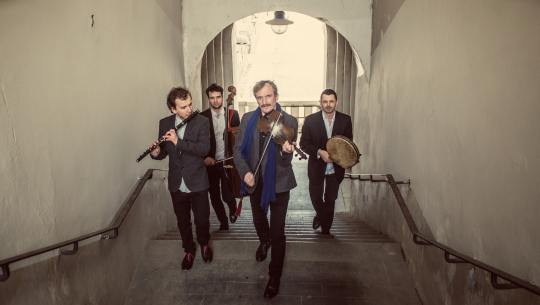|
The band that in the last decade, with its championing of old village musicians, event organizing, and its playing and teaching, has gone deep and revitalized Polish traditional mazurka dance and its music, generating a revival at home and spreading it in worldwide touring. A CD can't really give more than a hint of all that.
This is the fourth album. No fundamental change in the sound, but it's as gutsy as ever. Basically it's the characteristic traditional wild-flying instrumentation of abrasive fiddle (Janusz Prusinowski), chugging basy (unstopped 3-string cello-sized bowed bass), and thudding stick-hit tambourine or baraban bass drum (Piotr Piszczatowski), but this band's distinctive sound is completed by the less traditional flute and reeds (Michał Žak) and Szczepan Pospieszalski's trumpet, in mazurek and oberek's wiggly, asymmetric, hypnotic stretched three-beat rhythms. The vocals are led by fiddler Prusinowski, who also plays Polish accordion and hammered dulcimer. In the live quintet dance master Piotr Zgorzelski plays basy, when not out among the audience demonstrating and encouraging dancing, but it seems he doesn't play on this album, the basy role being taken by other band members.
There's a hint of a relationship with Poland's klezmer tradition in, "Deszczowy" ('Rainy'), with rain sounds accompanying Prusinowski's singing before Žak's winding klezmerish clarinet and the waltz-time um-ch-ch of alternating bass and violin take over the accompaniment. Then into the joyfully wiggling splurge of a typical mazurek in characteristic Kompania style, the fiddle and shawm topped out by trumpet underpinned by droning basy and pounding drum. Žak, on what sounds like an ocarina, opens the "Powolniak" that follows.
Prusinowski takes a short vocal solo in "Tu Będę Lulat", before leading on hammer-bouncing dulcimer, joined by sax and then clarinet, into the stately processional-like polonaise "Rubin". The combination of accordion, trumpet and clarinet in "Dobrezelin" have a circus-like jubilance. Incidentally, Polish accordions are a distinctive and intriguing breed, with multiple rows of keys. Prusinowski plays his again in the closer, the calm lyrical song "Gdzie Jest Ta Mitość".
The opening oberek, learned from Piotr Gaca (d. 2017), one of the Gaca brothers who were a popular group in the second half of the last century and, drawn into performing in the revival, have become iconic veterans, is an insistent example of that classic fiddle/basy/percussion instrumental trio sound. While a tribute to Gaca and a reflection of the album title, so a logical opener, its relentless abrasiveness, while classic, could perhaps be a rather steep learning curve for some new to the remarkable world of this music, though probably appealing to the curiosity of others.
But variety unfolds as the album progresses, in the jerky, short-phrased interplay of the instruments and voices, soaring and pausing, with the tambourine marking the staggering rhythms in a fashion that can be initially hard to comprehend but is an essential guide to dancers in these obereks, mazureks and more. After a while it all becomes, well, normal, almost. And to see, and, better, to participate in, the turning, flat-footed dancing to this music is to understand it and, for many, to become addicted. - Andrew Cronshaw
Find the artists online
|
